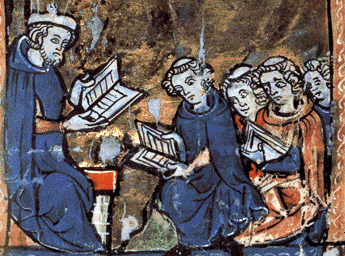Lausavísur §
Edited by Russell Poole
Fenris ‘of Fenrir’
[1, 2] sparra varra Fenris ‘the prop of the lips of Fenrir <wolf> [SWORD]’: The reference is to the story of the gods binding the wolf Fenrir and setting a sword with the hilt on his lower jaw and the point on his upper jaw to prevent him from biting. Snorri (Gylf, SnE 2005, 29) adds Þat er gómsparri hans ‘That is his gum-prop’, and gómsparri occurs as a sword-kenning in ESk Geisl 48/8VII.
Closevarra ‘of the lips’
[1, 2] sparra varra Fenris ‘the prop of the lips of Fenrir <wolf> [SWORD]’: The reference is to the story of the gods binding the wolf Fenrir and setting a sword with the hilt on his lower jaw and the point on his upper jaw to prevent him from biting. Snorri (Gylf, SnE 2005, 29) adds Þat er gómsparri hans ‘That is his gum-prop’, and gómsparri occurs as a sword-kenning in ESk Geisl 48/8VII.
Closesparra ‘the prop’
acc.
sparri (noun m.; °; -ar): °pind/stok (til at holde ngt fra hinanden), mundspærre
[1, 2] sparra varra Fenris ‘the prop of the lips of Fenrir <wolf> [SWORD]’: The reference is to the story of the gods binding the wolf Fenrir and setting a sword with the hilt on his lower jaw and the point on his upper jaw to prevent him from biting. Snorri (Gylf, SnE 2005, 29) adds Þat er gómsparri hans ‘That is his gum-prop’, and gómsparri occurs as a sword-kenning in ESk Geisl 48/8VII.
Closemalm ‘of the metal’
malmr (noun m.; °-s, dat. -i; -ar): metal < malmhríð (noun f.): weapon-storm
Closemalm ‘of the metal’
malmr (noun m.; °-s, dat. -i; -ar): metal < malmhríð (noun f.): weapon-storm
Closeí ‘in’
[4] í blóði Gamla ‘in Gamli’s blood’: Gamli Eiríksson, Haraldr gráfeldr’s brother, and predecessor as leader of the Gunnhildarsynir (Eiríkssynir), had been killed some time earlier in the battle of Rastarkálfr, an otherwise unknown locality on the island of Fræði (Frei, Møre og Romsdal), c. 955. For Gamli and the battle, see Gsind Hákdr 8, ÞSjár Þórdr 2 and Glúmr Lv.
CloseGamla ‘Gamli’s’
gamall (adj.; °gamlan; compar. & superl. ellri adj.): old
[4] í blóði Gamla ‘in Gamli’s blood’: Gamli Eiríksson, Haraldr gráfeldr’s brother, and predecessor as leader of the Gunnhildarsynir (Eiríkssynir), had been killed some time earlier in the battle of Rastarkálfr, an otherwise unknown locality on the island of Fræði (Frei, Møre og Romsdal), c. 955. For Gamli and the battle, see Gsind Hákdr 8, ÞSjár Þórdr 2 and Glúmr Lv.
Closeblóði ‘blood’
[4] í blóði Gamla ‘in Gamli’s blood’: Gamli Eiríksson, Haraldr gráfeldr’s brother, and predecessor as leader of the Gunnhildarsynir (Eiríkssynir), had been killed some time earlier in the battle of Rastarkálfr, an otherwise unknown locality on the island of Fræði (Frei, Møre og Romsdal), c. 955. For Gamli and the battle, see Gsind Hákdr 8, ÞSjár Þórdr 2 and Glúmr Lv.
Closeóstirfins ‘’
Closeóstirfinn ‘agreeable’
óstirfinn (adj./verb p.p.): [agreeable]
[5] óstirfinn ‘agreeable’: This is the only citation for the adj. in LP: óstirfinn and its meaning is unclear, except that it is the antonym of stirfinn ‘stiff-minded, stubborn, obstinate’ (see Fritzner, AEW: stirfinn). Konráð Gíslason (1892, 69, followed by Hkr 1893-1901, IV; Skj B; ÍF 26) suggests ‘cheerful and friendly [towards his men]’, which would fit with the wider context; Konráð notes a number of partial parallels to this motif. Bjarni Einarsson (ÍF 29) tentatively suggests an extended sense ‘brave, keen’.
Closearna ‘’
Closeeir ‘’
Closeþat ‘’
CloseGauta ‘Gautar’
acc. pl.
2. Gautr (noun m.): Gautr, Óðinn < gætigautr (noun m.)
[7] Gauta ‘Gautar <= Óðinns>’: The base-word of a kenning for ‘warriors’, probably the pl. of the Óðinn-name Gautr (and so previous eds). Names of gods are frequent in this role, and pl. forms occur, especially frequently in the case of Njǫrðr (Meissner 259). Gautar is also the name of the people of Gautland (Götaland), but this is unlikely here.
CloseTeaching text: text section
Here you can see a piece of text. Clicking on words in the text will show you the dictionary headword, grammatical information and notes on how the word is used.
You should pay careful attention to the explanation of each word. You can test your knowledge using the translation and other exercises.
In some cases there may be audio of a modern Icelandic rendition of the text on this page.
